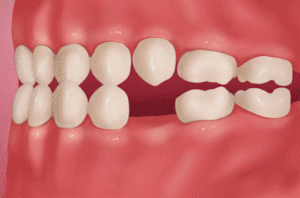Dental implant refers to the placement of an implant in the alveolar bone at the location of missing teeth through surgery, which is equivalent to installing an artificial tooth root. After the artificial tooth root and bone tissue grow firmly, an abutment, i.e. a connecting component, is installed on top of the tooth root. Finally, an artificial crown is installed on top of the abutment to achieve the purpose of repairing missing teeth. Clinically, dental implants can be divided into titanium alloy dental implants and all-ceramic dental implants, etc. according to the different constituent materials. In general, dental implant restoration does not require a large amount of grinding of normal natural teeth, can significantly improve the patient’s chewing function, has a good aesthetic effect, and is conducive to the preservation of local soft and hard tissues. At the same time, after the implant is completed, the patient will not have an obvious foreign body sensation, and the simulation is high. It has become the preferred repair method for more and more patients with missing teeth.

arget Group
Dental implants are suitable for people with partial or individual missing teeth, broken or missing dentition. People who have high requirements for denture restoration and cannot be satisfied with conventional dentures can undergo dental implant treatment.
Taboo group
1. Patients with serious lesions of solid organs such as the heart, lungs, liver, and kidneys, with incomplete functional compensation, threatening their life safety, and for whom anesthesia and surgery are dangerous.
2. Patients who are in critical condition, threatened with death at any time, and for whom anesthesia and surgery are extremely dangerous.
3. Patients receiving intravenous bisphosphonates.
4. Patients undergoing radiotherapy or chemotherapy.
5. Those who need to take steroids regularly.
6. Patients who are addicted to drugs or alcohol.
7. Patients with mental illness.
8. Patients with limited mouth opening, local soft and hard tissue lesions in the oral cavity, and severe functional movement disorders should first treat the primary disease. After these risk factors are controlled, a professional physician should assess whether dental implants are suitable.
9. Patients who are pregnant or in the jaw development stage are not suitable for dental implant surgery.
Technical/surgical risks
1. Missing interdental papilla: Missing interdental papilla between implant restoration and adjacent teeth forms a “black triangle”. The fundamental reason is the reconstruction of the alveolar crest after tooth extraction and the poor periodontal condition of adjacent teeth, which leads to a decrease in the height of the alveolar crest between implant and natural tooth or between implants. The solution may be to consider using non-invasive porcelain veneer or resin restoration to change the pointed round adjacent teeth into square round ones, so as to reduce the “black triangle”.
2. Labial gingival recession of implants: Labial gingival recession is mostly caused by the absorption of the labial bone plate of the implant, which reduces the bone height and then causes soft tissue recession. There is no reliable way to prevent the recession after the restoration is completed, and it is also difficult to remedy it. Therefore, when implanting the implant, it is necessary to ensure the ideal position of the implant in the three-dimensional direction, the axial direction and the implant’s penetration point, and to ensure that the labial bone tissue has a certain thickness.
3. The labial gums are dark in color: This is more common in patients with thin gums and is more obvious when using titanium abutments for restoration. Depending on the axial position and occlusion of the implant, if all-ceramic restoration is possible, the aesthetic effect can be improved to a certain extent.
4. Loose implants: The implants and the surrounding bone bed have not formed bone fusion, which may cause the implants to loosen. Loose implants should be removed. After removal, if the remaining implants are sufficient to support the denture, there is no need to implant again. If there is sufficient bone in the implant area, large-diameter implants can also be used for immediate in situ implantation, but it is necessary to pay attention to risk assessment.
5. Dislocation or damage of implant dentures: In such cases, surgery can be performed to remove them, and then the decision on whether to implant them again can be made based on the actual situation.
Postoperative Care
1. Local care: Do not brush your teeth within 24 hours after surgery. After 24 hours, you should clean your mouth by brushing your teeth in the morning and evening, gargling after meals, gargling with medicine, etc. Use a soft-bristled brush to clean the implant every morning and evening; do not chew hard or shake the tooth roots within 6 months after the stitches are removed; after installing artificial dentures, external force impacts in the oral area should be avoided.
2. Precautions for medication: Antibiotics should be routinely used under the guidance of a doctor after surgery. No medication is needed when the pain symptoms are not obvious; when the pain symptoms are more obvious, painkillers can be used under the guidance of a doctor.
3. Dietary precautions: You cannot fast immediately after surgery, and you can drink an appropriate amount of water 2 hours after surgery; in your daily diet, you should reduce the intake of foods that are too hard, sticky, too cold or too hot.
4. Follow-up examination: Follow-up examination should be carried out 1, 3, and 6 months after the operation to understand the depth of the periodontal pocket of the implant, the oral hygiene status, and the bone absorption around the implant; thereafter, you should go to the hospital for follow-up examination and cleaning every six months to remove dental plaque and tartar, and understand the oral health status.
Preoperative precautions
1. Communicate with the doctor before the operation to understand the specific process, related risks, and plan design of the implant denture surgery, and be mentally prepared.
2. Complete relevant examinations (such as heart, lung, blood, etc.) to confirm that there are no serious systemic diseases and no allergies to restorative materials or anesthetics.
3. If there is a history of surgical trauma, use of special medications, or repair with other cosmetic materials in the oral cavity or other related parts, you must inform your doctor in advance.
4. Patients who use special medications (such as the antiplatelet drug aspirin) should communicate with their doctors in advance.
5. Women should avoid menstruation, lactation and pregnancy periods.
6. For patients with special medical histories such as periodontal disease, acute or chronic oral inflammation, surgery should be delayed.
7. It is recommended to eat a light diet before surgery and avoid eating spicy, greasy, and hard foods.
8. Correct bad living habits and refrain from smoking and drinking before surgery.
9. Perform local oral cleaning before surgery.
Surgical Procedure
The doctor first disinfects and spreads the towel, performs anesthesia, and then cuts the soft tissue, positions and drills holes in the alveolar bone, then implants the implant in the hole in the alveolar bone, places a healing cap, and waits for the tissue to heal. After the tissue heals, the healing cap is replaced with a healing abutment and the restoration crown is installed.
